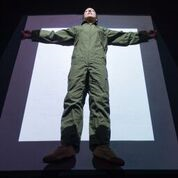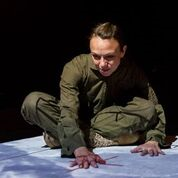
 Highly Recommended **** It’s the beginning of a new era for Uptown/Lakeview theatre. A year ago the north Broadway/Halsted area was a theatre district, but over the past summer Mary-Arrchie closed and Strawdog relocated due to the demolition of their building, Oracle relocated to a larger space, and the infamously lurid Profiles Theater Company closed after revelations of actual abuse and sexual exploitation. But now Profiles’ two former theatres have been acquired by Pride Films and Plays, an LGBT-themed company, which besides now having a home near Boystown, also rents to smaller productions. The first play in the Alley Theatre since Profiles’ closure is George Brant’s one-woman show Grounded, produced by the formerly Rhode Island-based Theatre of Thought Company. A critical, but humanistic, portrait of a military drone pilot, Grounded is exactly the sort of intelligent examination of violence and its aftershocks that the space needed to begin its new life as a positive location for theatre’s storytelling power.
Highly Recommended **** It’s the beginning of a new era for Uptown/Lakeview theatre. A year ago the north Broadway/Halsted area was a theatre district, but over the past summer Mary-Arrchie closed and Strawdog relocated due to the demolition of their building, Oracle relocated to a larger space, and the infamously lurid Profiles Theater Company closed after revelations of actual abuse and sexual exploitation. But now Profiles’ two former theatres have been acquired by Pride Films and Plays, an LGBT-themed company, which besides now having a home near Boystown, also rents to smaller productions. The first play in the Alley Theatre since Profiles’ closure is George Brant’s one-woman show Grounded, produced by the formerly Rhode Island-based Theatre of Thought Company. A critical, but humanistic, portrait of a military drone pilot, Grounded is exactly the sort of intelligent examination of violence and its aftershocks that the space needed to begin its new life as a positive location for theatre’s storytelling power.
Amber Kelly, the apparent driving force behind Theatre of Thought, plays the nameless Air Force pilot whose mental collapse we witness over the course of eighty minutes. Proceeded by pre-show rock and Jesus music, the pilot introduces herself by describing the delight she took in her missions over Iraq. The endless blue sky provided her with a feeling of complete freedom and control, and she doesn’t hesitate for a moment to tell us that bombing minarets and leaving rubble in her wake was part of the thrill. But one day she meets a guy, Eric, at a bar, and is impressed that he’s not intimidated by her. One thing leads to another, and having gotten pregnant, the pilot is obliged to take a leave of absence to avoid a g-force induced miscarriage. She and Eric marry, and though still in love, she eagerly awaits her return to the war.
The baby, Samantha, is born prematurely, forcing the pilot to take a longer maternal leave than she’d anticipated. Military technology changes a lot in just three years. The war in Afghanistan has returned to the top of the military’s priorities, and she is informed that she will now be flying one of the new Reaper drones from a base in Nevada. She is very unhappy, but agrees to relocate with her family, and make an hour-long commute across the desert each day to spend twelve hours staring at a screen. Most of the time, she sees nothing. Occasionally, she spots adult males engaged in such suspicious activities as standing near the road, driving off-road, or leaving their houses. The voice on her headset orders her to kill them, and she gleefully does, with a detached, ironic description of her targets as “bad guys” who have been judged guilty by the omnipotent eye in the sky.
For reasons that are obvious to everyone except, apparently, whoever designed her missions, the pilot’s mental health rapidly deteriorates. Unable to switch between being a ruthless killer and a loving wife and mother, her family life becomes increasingly strained, and she rarely has time for it, anyway. She also finds herself losing faith in her purpose. Reapers can hover, allowing her to spend hours observing scattered body parts through the drone’s “Gorgon’s Eye” (that’s the actual name for this kind of surveillance system), and the effect on her is different from blowing past in her F-16. Brant walks a very fine line in his writing between making the pilot an everywoman and providing hints of her character. She seems not to have any other friends or family, leaving her further isolated, and she never mentions who her philosophical influencers were. And yet, from her description of her life with Eric and Samantha, and her references to classical literature and mythology and classic rock, the text fills in just enough about her for her to feel like a real person, not a mere symbol.
Amber Kelly, who has worked with the military on sexual assault prevention programs, gives a performance that is as impressive as it is grueling. For about the first hour of the play, the pilot’s personality mostly shows in her wry eye movements and the cadence of her otherwise matter-of-fact delivery. Director Lexi Saunders ably guides her through the difficult blocking of a one-person play in an alley space, and projection designer Ben Zeman provides us with the closest thing we get to a physical context for the lonely pilot. The effect of externalizing the pilot’s mental process is all the more expressionistic for the projections’ general lack of color. It is the gradual distortion of her recognition of lights and colors while with her daughter which bring on the pilot’s meltdown, and Kelly’s increasing use of her physicality to accompany Brant’s vivid text take us on the character’s downward spiral with her. The show is much more complex than drones=bad, but it certainly doesn’t depict the way they are currently used as good. Thinking that you’ve become a god only to realize that you’re really Medusa is a horrifying process, but as the show demonstrates, the realization is the first step toward recovery. For the Chicago theatre, Grounded is an important demonstration of how to do stories about violence in a safe manner, which is actually much more affecting.
Grounded will be performed at Pride Arts Center, 4147 N Broadway, Chicago, thru November 6. Running time is eighty minutes with no intermission. Performances are as follows:
Fridays at 8:00 p.m.
Saturdays at 8:00 p.m.
Sundays at 2:00 p.m.
Tickets are $18-25 and may be purchased by visiting theatreofthought.com. Metered parking is available.
To see what others are saying, visit www.theatreinchicago.com, go to Review Round-Up and click at “Grounded.”







More Stories
“Waitress”
“Hedda Gabler”
“Clue”